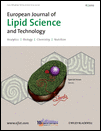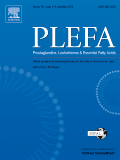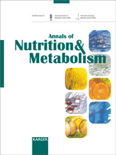
EUROPEAN JOURNAL OF LIPID SCIENCE AND TECHNOLOGY
Scope & Guideline
Transforming nutritional science through lipid innovation.
Introduction
Aims and Scopes
- Lipid Chemistry and Biochemistry:
Research on the chemical structures, reactions, and biochemical pathways of lipids, including fatty acids, triglycerides, phospholipids, and sterols. - Lipid Technology and Processing:
Innovations in lipid processing methods, including extraction, refining, and modification techniques aimed at improving oil quality and functionality. - Nutritional and Health Aspects of Lipids:
Studies examining the role of lipids in nutrition, their health implications, and their effects on metabolic processes. - Functional Lipids and Applications:
Exploration of functional lipids in food, pharmaceuticals, and cosmetics, focusing on their bioactive properties and potential health benefits. - Lipidomics and Analytical Techniques:
Advancements in lipid analysis, including lipidomic profiling and the development of new analytical methods for characterizing lipid species.
Trending and Emerging
- Nanoencapsulation and Delivery Systems:
Research on lipid-based nanoencapsulation techniques for drug delivery and functional food applications is on the rise, highlighting the importance of lipids in enhancing bioavailability and targeted delivery. - Health Effects of Specific Lipids:
An increasing focus on the health benefits and therapeutic potential of specific lipid types, such as omega-3 fatty acids, phospholipids, and bioactive lipid compounds, reflects a growing interest in nutritional biochemistry. - Sustainability and Green Processing:
There is a notable trend towards sustainable practices in lipid processing and extraction, including the use of green solvents and waste valorization, addressing environmental concerns in the lipid industry. - Lipidomics and Metabolomics:
The integration of lipidomics with metabolomics is emerging as a significant area of research, allowing for comprehensive insights into lipid metabolism and its implications in health and disease. - Functional Lipids in Cosmetic and Pharmaceutical Applications:
Growing interest in the use of lipids for functional applications in cosmetics and pharmaceuticals, particularly their role in skin health and drug formulation, is becoming a prominent research area.
Declining or Waning
- Traditional Lipid Extraction Methods:
While traditional lipid extraction techniques have been foundational, there has been a noticeable decline in studies focusing solely on these methods as more efficient and innovative approaches, such as supercritical fluid extraction and enzymatic extraction, gain traction. - Basic Lipid Composition Studies:
Research dedicated solely to the basic composition of lipids in various sources is becoming less frequent, as studies increasingly focus on functional properties and health effects rather than just compositional analysis. - Lipid Use in Conventional Food Products:
The exploration of lipid applications in conventional food products is waning, with a shift towards more innovative and functional lipid applications in health and nutraceuticals.
Similar Journals

PROSTAGLANDINS LEUKOTRIENES AND ESSENTIAL FATTY ACIDS
Pioneering Discoveries in Essential Fatty Acid SciencePROSTAGLANDINS LEUKOTRIENES AND ESSENTIAL FATTY ACIDS is a distinguished peer-reviewed journal dedicated to advancing the understanding of the biological roles of prostaglandins, leukotrienes, and essential fatty acids in human health and disease. Published by Elsevier Science Ltd, this journal has been at the forefront of research since its inception in 1988 and continues to serve as a vital resource for researchers, clinicians, and students involved in the fields of biochemistry and cell biology. With its impact factor reflecting a solid academic presence—ranking Q3 in Cell Biology and Q2 in Clinical Biochemistry in 2023—this journal is recognized for its quality contributions, particularly in uncovering the biochemical pathways and clinical implications of these lipid mediators. Though not an open-access journal, it provides various access options to ensure the dissemination of critical findings. As the field evolves, PROSTAGLANDINS LEUKOTRIENES AND ESSENTIAL FATTY ACIDS remains a pivotal platform for the exploration and discussion of new methodologies, therapeutic avenues, and biological discoveries that impact patient care and the foundational sciences.

BIOCHIMICA ET BIOPHYSICA ACTA-MOLECULAR AND CELL BIOLOGY OF LIPIDS
Innovating Research in Cell and Molecular Lipid BiologyBIOCHIMICA ET BIOPHYSICA ACTA-MOLECULAR AND CELL BIOLOGY OF LIPIDS, published by Elsevier, is a leading academic journal that focuses on advancing the field of lipid biology. With an ISSN of 1388-1981 and an E-ISSN of 1879-2618, this journal has established itself as an essential resource for researchers, professionals, and students interested in cell and molecular biology, particularly regarding lipid interactions and functions. The journal boasts an impressive impact factor, standing in the top quartiles of its categories—Q1 in Molecular Biology and Q2 in Cell Biology. As part of the vibrant academic landscape of the Netherlands, it supports both traditional and open access publication models, ensuring that vital research is accessible to a global audience. The converged years from 1998 to 2025 mark its sustained commitment to quality and relevance in the fast-evolving field of lipid research. With a strong ranking in Scopus and a percentile in the 80th range in both Molecular Biology and Cell Biology, this journal continues to be a pivotal platform for scholarly communication and innovation in lipid-related research.

Nature Metabolism
Pioneering research at the forefront of metabolic science.Nature Metabolism, published by NATURE PORTFOLIO, is a leading journal dedicated to advancing the field of metabolic research and its implications across various biological systems. Since its inception in 2019, this esteemed journal has rapidly established itself as a vital resource for researchers, professionals, and students alike, reflecting its prominence through a prestigious Q1 ranking in several key categories including Cell Biology, Endocrinology, Diabetes and Metabolism, Internal Medicine, and Physiology. With an impressive Scopus ranking, underscoring its impact in Medicine and Biochemistry disciplines, Nature Metabolism offers an exceptional platform for disseminating high-quality research that explores the intricate mechanisms of metabolism and its association with health and disease. Although currently not open access, it continues to gain visibility and appreciation within the scientific community, ensuring that groundbreaking findings reach interested audiences globally from its hub in Berlin, Germany. Whether you are an experienced researcher or an aspiring student, Nature Metabolism serves as an invaluable asset in navigating the complexities of metabolic science.

Lipids in Health and Disease
Illuminating the impact of lipids on health and disease.Lipids in Health and Disease, published by BMC, stands as a leading open-access journal dedicated to advancing the understanding of lipid metabolism and its implications for health and disease. Since its inception in 2002, this journal has fostered accessibility to cutting-edge research, ensuring that knowledge in this vital field is disseminated widely to researchers, clinicians, and students worldwide. With a commendable Q1 ranking in multiple categories including Clinical Biochemistry and Endocrinology, Diabetes and Metabolism, it appeals to a diverse readership, positioning itself at the forefront of research in biochemistry and medicine. It boasts an impressive Scopus rank, where it excels in areas such as Endocrinology, Diabetes and Metabolism and Clinical Biochemistry, making it an essential resource for those looking to deepen their understanding of lipid biology and its clinical applications. Researchers can share and access findings that have significant implications for public health and disease prevention, emphasizing the journal's commitment to fostering innovation and collaboration in the scientific community.

BIOCHIMICA ET BIOPHYSICA ACTA-BIOMEMBRANES
Catalyzing Innovations in Membrane StudiesBIOCHIMICA ET BIOPHYSICA ACTA-BIOMEMBRANES is a prestigious journal dedicated to advancing the field of biomembrane research, published by Elsevier. With a notable track record since its inception in 1967, this journal operates under the dual ISSN 0005-2736 and E-ISSN 1879-2642, and has firmly established itself within the scientific community by ranking in the top tiers of various disciplines, including Q2 in Biochemistry and Cell Biology, and Q1 in Biophysics as of 2023. Its impressive Scopus rankings further underscore its importance, with a rank of 24 in Biophysics reflecting its strong impact on ongoing research. Although it does not offer open access, the journal provides comprehensive insights and breakthroughs essential for scientists, researchers, and advanced students focused on biophysical and biochemical aspects of membranes. By disseminating pivotal findings, BIOCHIMICA ET BIOPHYSICA ACTA-BIOMEMBRANES contributes significantly to understanding cellular mechanisms, thereby serving as a vital resource for professionals aiming to explore the complexities of biological membranes.

Cancer & Metabolism
Illuminating Metabolic Pathways in Cancer ProgressionCancer & Metabolism is a distinguished open-access journal published by BMC, dedicated to advancing the understanding of the complex interactions between cancer biology and metabolic processes. Since its inception in 2013, it has provided a platform for researchers, clinicians, and students to disseminate groundbreaking research and innovative findings within the fields of oncology and metabolism. The journal, identified by its E-ISSN 2049-3002, is recognized for contributing valuable insights into metabolic alterations that influence cancer progression, treatment responses, and overall patient outcomes. With a firm commitment to open access, Cancer & Metabolism ensures that research is freely available to the global scientific community, fostering collaboration and accelerating discoveries that can lead to improved therapeutic strategies. As a vital resource in cancer research, this journal appeals to a broad audience, including researchers looking to share their latest findings, professionals seeking to stay informed on cutting-edge developments, and students eager to delve into the relationship between metabolism and cancer.

LIPIDS
Bridging disciplines through lipid exploration.LIPIDS is a renowned peer-reviewed journal published by Wiley, dedicated to the field of lipid research, encompassing biochemistry, molecular biology, and organic chemistry. With its roots dating back to 1966 and a commitment to advancing knowledge until 2024, this journal serves as a vital platform for sharing significant findings in lipid biochemistry and its applications in health and disease. Although it currently does not offer Open Access options, it maintains a respectable standing with a Q3 ranking in Biochemistry and Organic Chemistry, and a Q4 ranking in Cell Biology based on the 2023 category quartiles. Additionally, its Scopus rankings reflect a solid position within the organic chemistry and biochemistry subfields. Published from Germany, LIPIDS caters to researchers, professionals, and students eager to explore the roles of lipids in biological processes and innovatory applications in various scientific disciplines.

Journal of Clinical Lipidology
Transforming understanding in lipidology and its clinical applications.Journal of Clinical Lipidology, published by Elsevier Science Inc, is a leading platform dedicated to advancing the understanding of lipidology and its impact on cardiovascular health. With an ISSN of 1933-2874 and E-ISSN 1876-4789, this esteemed journal boasts a remarkable Q1 ranking in key medical categories, including Cardiology and Cardiovascular Medicine, Internal Medicine, and Nutrition and Dietetics, solidifying its position as a vital resource for the latest research and clinical practices. This journal not only serves as a repository for groundbreaking studies but also provides insights into complex interactions between lipid metabolism and chronic diseases, including diabetes and obesity. Researchers, practitioners, and students will find a wealth of carefully vetted articles that drive innovation and improve patient outcomes in lipid management. Although it does not currently offer open access, the Journal of Clinical Lipidology ensures high visibility through rigorous peer review and a commitment to quality, making it an essential read for anyone invested in the future of lipidology.

ANNALS OF NUTRITION AND METABOLISM
Exploring the Interplay of Diet, Health, and DiseaseANNALS OF NUTRITION AND METABOLISM is a prestigious academic journal dedicated to advancing the fields of nutrition and metabolism, published by KARGER, a renowned publisher known for its commitment to high-quality research dissemination. Founded in 1959, this journal has established itself as a crucial resource for researchers and practitioners alike, spanning an extensive range of topics that highlight the interplay between diet, health, and disease. Currently seated in Q2 categorically both in Medicine (Miscellaneous) and Nutrition and Dietetics, the journal ranks impressively within the Scopus metrics, showcasing its relevance and impact—positioned at the 80th percentile in Medicine and the 71st percentile in Nutrition. Though not open access, the journal ensures broad accessibility through various academic databases. By focusing on innovative research findings and clinical insights, the ANNALS OF NUTRITION AND METABOLISM aims to foster a deeper understanding of nutritional science, making it an indispensable platform for academics, healthcare professionals, and students alike to enhance their knowledge and contribute to ongoing discussions in this vital field.

GRASAS Y ACEITES
Unlocking the potential of fats and oils for a healthier future.GRASAS Y ACEITES, published by the Consejo Superior Investigaciones Científicas (CSIC)Food Science and Organic Chemistry since 1991. Based in Madrid, Spain, this journal facilitates the dissemination of innovative research and cutting-edge discoveries pertaining to fats and oils, addressing both their nutritional properties and functional applications. The journal holds a commendable position within the academic community, ranking in the third quartile in both its categories as of 2023, and features a dedicated platform for dialogue among researchers, professionals, and students. By providing unhindered access to its publications, GRASAS Y ACEITES fosters a collaborative environment for advancing knowledge and understanding in its respective fields, making it an essential resource for those invested in food science and organic chemical research.